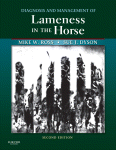Helping you to apply many different diagnostic tools, Diagnosis and Management of Lameness in the Horse, 2nd Edition explores both traditional treatments and alternative therapies for conditions that can cause gait abnormalities in horses. Written by an international team of authors led by Mike Ross and Sue Dyson, this resource describes equine sporting activities and specific lameness conditions in major sport horse types. It emphasizes accurate and systematic observation and clinical examination, with in-depth descriptions of diagnostic analgesia, radiography, ultrasonography, nuclear scintigraphy, magnetic resonance imaging, computed tomography, thermography, and surgical endoscopy. Broader in scope than any other book of its kind, this edition includes a companion website with 47 narrated video clips demonstrating common forelimb and hindlimb lameness as well as gait abnormalities.
Cutting-edge information on diagnostic application for computed tomography and magnetic resonance imaging includes the most comprehensive section available on MRI in the live horse.
Coverage of traditional treatment modalities also includes many aspects of alternative therapy, with a practical and realistic perspective on prognosis.
An examination of the various types of horses used in sports describes the lameness conditions to which each horse type is particularly prone, as well as differences in prognosis.
Guidelines on how to proceed when a diagnosis cannot easily be reached help you manage conditions when faced with the limitations of current diagnostic capabilities.
Clinical examination and diagnostic analgesia are given a special emphasis.
Practical, hands-on information covers a wide range of horse types from around the world.
A global perspective is provided by a team of international authors, editors, and contributors.
A full-color insert shows thermography images.
Updated chapters include the most current information on topics such as MRI, foot pain, stem cell therapy, and shock wave treatment.
Two new chapters include
The Biomechanics of the Equine Limb and its Effect on Lameness and
Clinical Use of Stem Cells, Marrow Components, and Other Growth Factors. The chapter on the hock has been expanded substantially, and the section on lameness associated with the foot has been completely rewritten to include state-of-the-art information based on what has been learned from MRI. Many new figures appear throughout the book.
A companion website includes 47 narrated video clips of gait abnormalities, including typical common syndromes as well as rarer and atypical manifestations of lameness and neurological dysfunction, with commentary by author/editors Mike Ross and Sue Dyson.
References on the companion website are linked to the original abstracts on PubMed.


دیدگاه کاربران